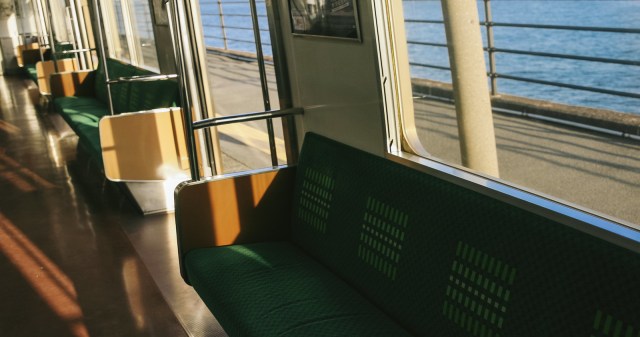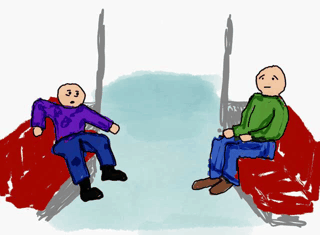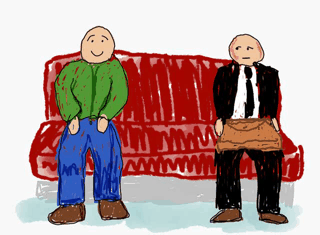
The same anomaly that makes foreigners feel icky is harnessed by Japanese people to get breathing room on public transport.
With its intricate network of public transportation, Japan can be an easy place to get around in. But these means of travel are not without the same problems found anywhere else in the world, be it sleepy passengers slouching on your shoulder or guys spontaneously rubbing their nipples.
However, a recent tweet posted by cosplayer Satomi Ishihara (@kardr_maru) claims to have found a method which is highly effective at repelling these unwanted seatmates.
飛行機で隣の席の若者がめちゃくちゃスペースを侵害してきて不快だったんだけど
— ほ🦖🦍や (@kardr_maru) July 21, 2019
「電車の中で足広げてくる奴が横にいたが英字新聞を広げたら小さくなった こういう奴は自分より頭の良い相手に強く出れない」ツイを思い出し、パソコンにある英論文PDFを開いたら少しずつお行儀良くなったのでこれはガチ
▲ “On a flight the young guy in the seat next to me was invading my space way too much and making me uncomfortable. But I remembered a tweet I had read that said, ‘There was a guy next to me on the train spreading his legs, but when I opened an English newspaper he closed them right up.’ So I opened an English thesis PDF on my computer and little by little his behavior improved. This is the real deal!”
Like Ishihara said, this is actually a theory that has been floating around the Internet for a while in which reading, or even just appearing to read, English will create an invisible barrier between them and other Japanese people on planes and trains.
Many others came out in response to this with their own testimonies.
“I do this a lot. It’s especially effective if you make handwritten notes and a highlighter.”
“I keep an English paper on my cloud drive for this very reason.”
“I did this once, but it backfired when some tourists asked me for directions… I can’t really speak English well.”
“The Bible would probably work best for this.”
“I found myself getting extra space when I dyed my hair brown.”
“I wonder if I could achieve this by eating alphabet-shaped chocolates…”
This reaction to English text might seem novel to some Japanese people online, but to foreigners living in Japan it is an all too common occurrence. Known as the “gaijin seat” phenomenon, it is such that any time a visibly foreign person sits down on any type of public seat, the seats next to them will likely remain vacant.
Columnist and author Baye McNeil has perhaps written the most extensively on this topic, which he refers to more diplomatically as the “empty seat phenomenon.” Here he is discussing it with YouTuber Sharla.
The reason for the empty seats isn’t entirely clear and probably also isn’t singular. From talking to people, the best reason I could find is that many Japanese people have a view of foreigners as being very gregarious people who will naturally strike up a conversation with anyone nearby.
Therefore, out of fear of getting trapped in a conversation in a language other than their own, they simply sit elsewhere or not at all. It’s not an entirely unreasonable anxiety when you think about it, but even despite the luxury of space it affords, this can’t help but sting at least a little to the foreigner who’s sitting all by their lonesome as if they stank of root beer and grape skins.
My most memorable instance was when one woman boarded a train and was faced with the dilemma of sitting next to either myself or a Japanese man who was staring off into space and repeatedly punching the air. She made the only choice she could and sat next to the man battling imaginary fairies.
▼ Budget-conscious CG reenactment
A less shocking but more common occurrence is the person who – on a completely packed train – will sit one seat down from me and then put their bag on the seat next to mine. It’s as if they are saying “Look, we all know no one’s going to sit next to your root-beer smelling ass, so why keep this heavy thing on my lap for nothing?”
▼ Budget-conscious CG reenactment
In addition to his coverage of empty seat phenomenon, McNeil also talks a lot about how people have to develop a self-awareness of their own ingrained perspectives when living in another country. And therein lies the key to overcoming knee-jerk offenses to that empty seat that haunts many on the train.
I need to realize that the woman who didn’t sit beside me probably wasn’t making a statement on my race or soda orientation. Rather those are my own assumptions based on my own background that I’m projecting onto her.
Also, realizing that the man punching the air was probably really saving the entire world by telepathically fighting in an interstellar war, goes a long way at taking the bite out of not being sat beside.
And since Japanese people themselves are now quickly learning how to weaponize the empty seat phenomenon against each other, we may see it come to an end in our lifetime anyway.
Source: Twitter/@kardr_maru, Hachima Kiko
Top image: Pakutaso
Insert Images: SoraNews24
● Want to hear about SoraNews24’s latest articles as soon as they’re published? Follow us on Facebook and Twitter!



 Japanese celebrity (sort of) apologizes for swapping seats with foreign traveler on Shinkansen
Japanese celebrity (sort of) apologizes for swapping seats with foreign traveler on Shinkansen Downloads of 39-year-old Guns N’ Roses song increase 12,166 percent thanks to Gundam
Downloads of 39-year-old Guns N’ Roses song increase 12,166 percent thanks to Gundam Swapping seats on Japan’s bullet trains is not allowed, Shinkansen operator says
Swapping seats on Japan’s bullet trains is not allowed, Shinkansen operator says A look back on 40 years of Japanese schools banning stuff
A look back on 40 years of Japanese schools banning stuff Japan manners debate: Is it OK to put a Mister Donut donut back on the shelf after taking it?
Japan manners debate: Is it OK to put a Mister Donut donut back on the shelf after taking it? Lawson convenience stores sell a mega katsu sando, and there’s a hack to get it cheap in Japan
Lawson convenience stores sell a mega katsu sando, and there’s a hack to get it cheap in Japan How to easily make Salmon & Cheese Grilled Rice Balls, a tasty camp food【SoraKitchen】
How to easily make Salmon & Cheese Grilled Rice Balls, a tasty camp food【SoraKitchen】 Japan has omurice chocolate, and the weirdest thing isn’t how it tastes
Japan has omurice chocolate, and the weirdest thing isn’t how it tastes The hallucinatingly warm bedsheets of Japan’s favorite cheap home furnishings brand【Photos】
The hallucinatingly warm bedsheets of Japan’s favorite cheap home furnishings brand【Photos】 We try an unusual buffet of dishes made from wild game at a roadside stop in Chiba
We try an unusual buffet of dishes made from wild game at a roadside stop in Chiba Majority of Japanese women in survey regret marrying their husband, but that’s only half the story
Majority of Japanese women in survey regret marrying their husband, but that’s only half the story Is China’s don’t-go-to-Japan warning affecting the lines at a popular Tokyo gyukatsu restaurant?
Is China’s don’t-go-to-Japan warning affecting the lines at a popular Tokyo gyukatsu restaurant? Three beautiful places to see Japan’s plum blossoms after starting your day in downtown Tokyo
Three beautiful places to see Japan’s plum blossoms after starting your day in downtown Tokyo Cherry blossom forecasts map shows Japan’s OTHER sakura season is starting right now
Cherry blossom forecasts map shows Japan’s OTHER sakura season is starting right now Yokai are descending upon Tokyo this spring in the latest immersive art experience
Yokai are descending upon Tokyo this spring in the latest immersive art experience New Studio Ghibli stamps leave an impression on your stationery…and your heart
New Studio Ghibli stamps leave an impression on your stationery…and your heart Japanese women sound off on their minimum height requirements for a husband【Survey】
Japanese women sound off on their minimum height requirements for a husband【Survey】 Huge Evangelion Unit-01 head appearing in lights in Japan to celebrate anime’s 30th anniversary
Huge Evangelion Unit-01 head appearing in lights in Japan to celebrate anime’s 30th anniversary Kyoto planning surprise late-night inspections of Airbnb-style rentals to fight overtourism
Kyoto planning surprise late-night inspections of Airbnb-style rentals to fight overtourism Family Mart releases huge range of cute sweets for Cat Day in Japan
Family Mart releases huge range of cute sweets for Cat Day in Japan Starbucks Japan releases new drinkware and goods for Valentine’s Day
Starbucks Japan releases new drinkware and goods for Valentine’s Day Japan releases first official sakura cherry blossom forecast for 2026
Japan releases first official sakura cherry blossom forecast for 2026 Archfiend Hello Kitty appears as Sanrio launches new team-up with Yu-Gi-Oh【Pics】
Archfiend Hello Kitty appears as Sanrio launches new team-up with Yu-Gi-Oh【Pics】 Starbucks Japan releases new Frappuccino and latte for Valentine’s Day
Starbucks Japan releases new Frappuccino and latte for Valentine’s Day China’s don’t-go-to-Japan warning looks to be affecting tourist crowds on Miyajima
China’s don’t-go-to-Japan warning looks to be affecting tourist crowds on Miyajima Our 52-year-old pole dancing reporter shares his tips for achieving your New Year’s exercise goal
Our 52-year-old pole dancing reporter shares his tips for achieving your New Year’s exercise goal 10 times to avoid traveling in Japan in 2026
10 times to avoid traveling in Japan in 2026 Studio Ghibli releases new “komorebi” plush toys from Princess Mononoke and Spirited Away
Studio Ghibli releases new “komorebi” plush toys from Princess Mononoke and Spirited Away Survey asks foreign tourists what bothered them in Japan, more than half gave same answer
Survey asks foreign tourists what bothered them in Japan, more than half gave same answer Japan’s human washing machines will go on sale to general public, demos to be held in Tokyo
Japan’s human washing machines will go on sale to general public, demos to be held in Tokyo We deeply regret going into this tunnel on our walk in the mountains of Japan
We deeply regret going into this tunnel on our walk in the mountains of Japan Studio Ghibli releases Kodama forest spirits from Princess Mononoke to light up your home
Studio Ghibli releases Kodama forest spirits from Princess Mononoke to light up your home Major Japanese hotel chain says reservations via overseas booking sites may not be valid
Major Japanese hotel chain says reservations via overseas booking sites may not be valid Put sesame oil in your coffee? Japanese maker says it’s the best way to start your day【Taste test】
Put sesame oil in your coffee? Japanese maker says it’s the best way to start your day【Taste test】 No more using real katana for tourism activities, Japan’s National Police Agency says
No more using real katana for tourism activities, Japan’s National Police Agency says Starbucks Japan reveals new sakura drinkware collection, inspired by evening cherry blossoms
Starbucks Japan reveals new sakura drinkware collection, inspired by evening cherry blossoms Updated cherry blossom forecast shows extra-long sakura season for Japan this year
Updated cherry blossom forecast shows extra-long sakura season for Japan this year
Leave a Reply